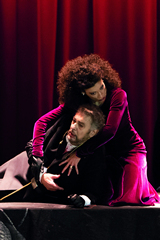| Opera Reviews | 8 May 2024 |
A tale of two Macbeth'sby Moore Parker |
|
| Verdi: Macbeth Theater an der Wien 15 & 20 November 2016 |
|
|
For whatever reason, the Theater an der Wien chose to present two versions of Verdi’s masterpiece in one setting, with alternate title leads, but - rather than offering both the 1847 Florence and the 1865 Paris versions intact as written - simply chose to present a hybrid for the second cast in which Plácido Domingo closed the show with Macbeth’s 'Mal per me che m’affidai' (from the 1847 Florence version). The concept of percolating the essence of the subject matter to illustrate ubiquitous human facets (comprising ethics, lust, and power) in a fairly neutral setting (whereby a child’s vintage perambulator hints at mid-20th century) here often fails more in execution than in ideas - an issue regrettably magnified in the performance featuring Roberto Frontali and Adina Aaron compared to that with Domingo and Davinia Rodriguez who managed to make more of the concept and mask certain potential failings. Indeed, the latter showing saw an all-encompassing artistic elevation with a tauter orchestral performance, improved choral accuracy, and greater energy among the other protagonists. However the budget set remains, with its black upper walls in glossy-waved design and floor-level red curtains lending a rather tacky impression (staging, Johannes Leiacker), and solely providing entries and exits rather reminiscent of an amateur church hall pantomime. A rotunda floats and rotates across the stage with a mirrored interior - which to some degree breaks the monotony of the basic set. One significant exception is the captivating Act 3 opening, in which an ingenious multi-layered video screening (David Haneke) of Hieronymous Bosch’s The Last Judgement is animated to intertwine with Macbeth’s nightmare and terror as he and the witches interact. Other elements feature Lady Macbeth’s pet rats (alive and seemingly enjoying the limelight of Act 1’s prelude), which subsequently reappear (sadly demised) in the Lady’s sleepwalking scene - evidently predicting the ultimate fate of the the two accomplices. Birnam Wood is depicted by a solitary tree which sheds a flurry of leaves from the flies at the appropriate moment, while each member of the nightclub “showtime” opening (witches) chorus is bi-gender in garb and make up - an idea which rather overstretched the dancing talents of the Arnold Schoenberg Choir’s ladies (choreography, Peter Karolyi). Macbeth’s letter to his Lady is transformed into a dialogue between the couple, and in 'Vieni t’affretta' the Lady draws a flick knife from her jacket pocket to promote the proposed deed. Character definition and interaction among the protagonists is pretty basic, and offset really only by experience and talent in certain cases. The November 20 performance found Plácido Domingo in exceptional form. Sounding truly more baritonal (and less “Domingoesque”) than in any of his escapades in this new phase of his career, his register balance appears to have adjusted - becoming less foreign within the Verdi baritone compass, and only occasionally (in mid-range legato passages) revealing a dearth of ideal mellifluous lyricism. Domingo’s intensity, stage presence, and vocal culture are a remarkable beacon - echoing the standards of a bygone generation. Davinia Rodriguez is a compelling Lady Macbeth. Audibly diligent and equipped with musical and dramatic insight, one thrills at her consummate scale work, perfectly integrated trills, palette of vocal colours, and an easy extension through to a gleaming top D-flat to close Act 1. (A pity she chose in the sleepwalking scene to disconnect the same note within the final phrase). Rodriguez' intensity is a perfect foil to Domingo’s reading - dominant and seductive, and burning with an ambition which here extended beyond sheer lust for power to glaringly serve as a vehicle for sexual gratification. Heading the opening night cast Roberto Frontali presented a solid Macbeth, rather gruff in delivery and without any of the finesse or vocal gold of legendary interpreters (or indeed the presence and sheer know-how of the alternate choice in this series), but claiming a very respectable showing. Frontali’s Lady, Adina Aaron, is an attractive, slinky performer, well-suited to the on-stage erotic moments with her spouse, and in possession of a potentially interesting and multi-facetted instrument. Alas her vocal production is unruly and erratic, often varying from indistinguishable whispers to uncontrolled blasts which were unfailingly under pitch at the top of her range. The final phrase of the “Sleepwalking scene” was simply re-arranged to avoid the high D-flat by commencing an octave lower - with an arpeggio ascent to an A-flat instead. Of the remaining leads, Arturo Chacón-Cruz (Macduff) fared well with his impassioned lyrical reading and an Italianate ring to his top which thrilled the audience. Stefan Kocan’s Banco had a nice dark bite to his tone, but could further develop grandeur in stage craft and a somewhat more distinguished delivery in his vocal production. As hinted earlier, Bertrand de Billy’s reading with the Vienna Symphony Orchestra varied considerably between the two listed performances. While maintaining a close rein with all the forces to hand, odd moments appeared seriously plump (particularly in the double bass and percussion sections) with unusually slow tempi on the evening with Frontali and Aaron which - albeit - found new form, animation, and finesse when fusing with the Rodriguez and Domingo constellation.
|
|
| Text ©
Moore Parker Photo © Herwig Prammer |

 This autumn is truly Macbeth season in Vienna, with the Theater an der Wien mounting a new production by the company’s General Administrator, Roland Geyer, and with the Vienna State Opera preparing a revival of their familiar Christian Räth version.
This autumn is truly Macbeth season in Vienna, with the Theater an der Wien mounting a new production by the company’s General Administrator, Roland Geyer, and with the Vienna State Opera preparing a revival of their familiar Christian Räth version.





